Entrepreneurship & Small Business Management Typologies: Doc
VerifiedAdded on 2021/01/02
|17
|4740
|471
AI Summary
Contribute Materials
Your contribution can guide someone’s learning journey. Share your
documents today.

Entrepreneurship and Small
Business Management
Business Management
Secure Best Marks with AI Grader
Need help grading? Try our AI Grader for instant feedback on your assignments.
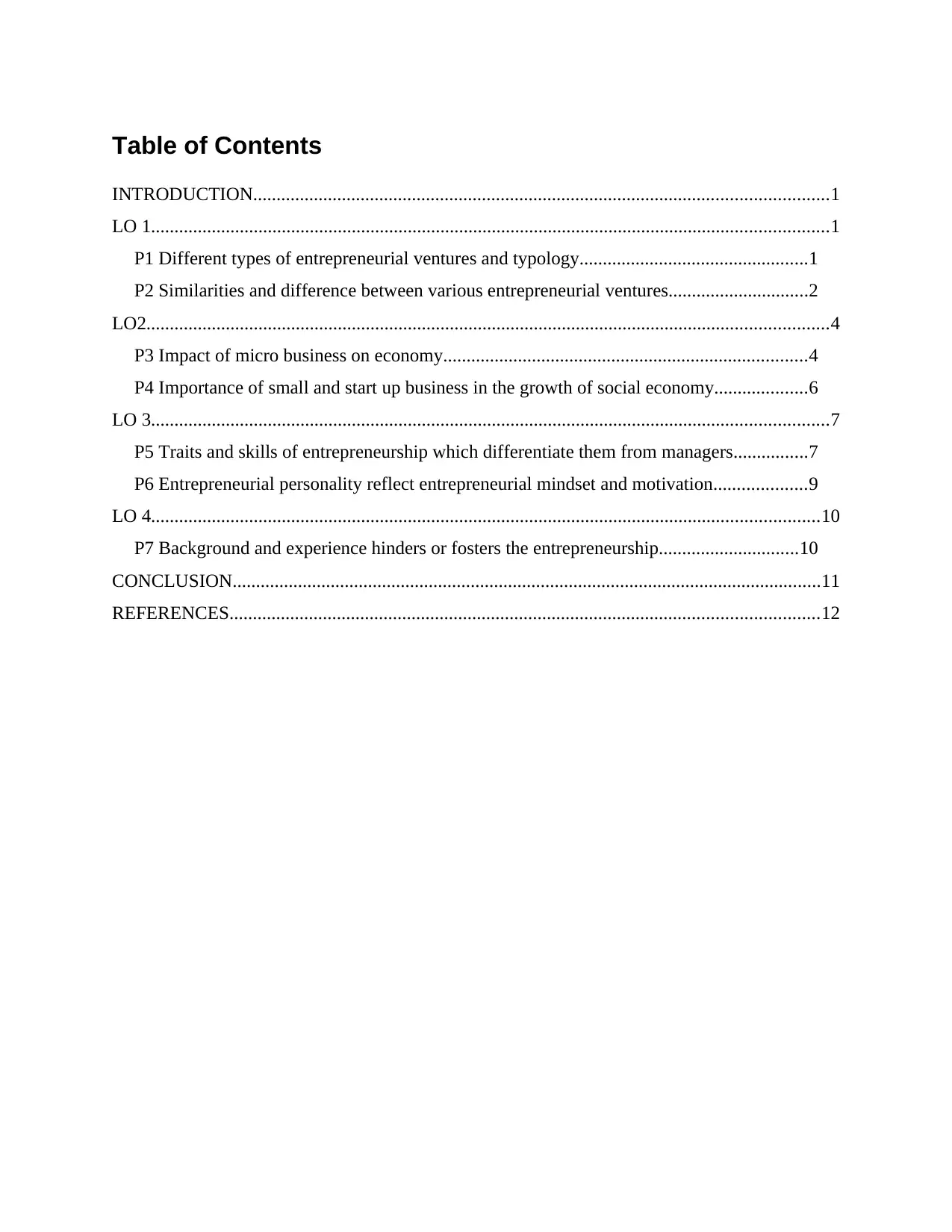
Table of Contents
INTRODUCTION...........................................................................................................................1
LO 1.................................................................................................................................................1
P1 Different types of entrepreneurial ventures and typology.................................................1
P2 Similarities and difference between various entrepreneurial ventures..............................2
LO2..................................................................................................................................................4
P3 Impact of micro business on economy..............................................................................4
P4 Importance of small and start up business in the growth of social economy....................6
LO 3.................................................................................................................................................7
P5 Traits and skills of entrepreneurship which differentiate them from managers................7
P6 Entrepreneurial personality reflect entrepreneurial mindset and motivation....................9
LO 4...............................................................................................................................................10
P7 Background and experience hinders or fosters the entrepreneurship..............................10
CONCLUSION..............................................................................................................................11
REFERENCES..............................................................................................................................12
INTRODUCTION...........................................................................................................................1
LO 1.................................................................................................................................................1
P1 Different types of entrepreneurial ventures and typology.................................................1
P2 Similarities and difference between various entrepreneurial ventures..............................2
LO2..................................................................................................................................................4
P3 Impact of micro business on economy..............................................................................4
P4 Importance of small and start up business in the growth of social economy....................6
LO 3.................................................................................................................................................7
P5 Traits and skills of entrepreneurship which differentiate them from managers................7
P6 Entrepreneurial personality reflect entrepreneurial mindset and motivation....................9
LO 4...............................................................................................................................................10
P7 Background and experience hinders or fosters the entrepreneurship..............................10
CONCLUSION..............................................................................................................................11
REFERENCES..............................................................................................................................12
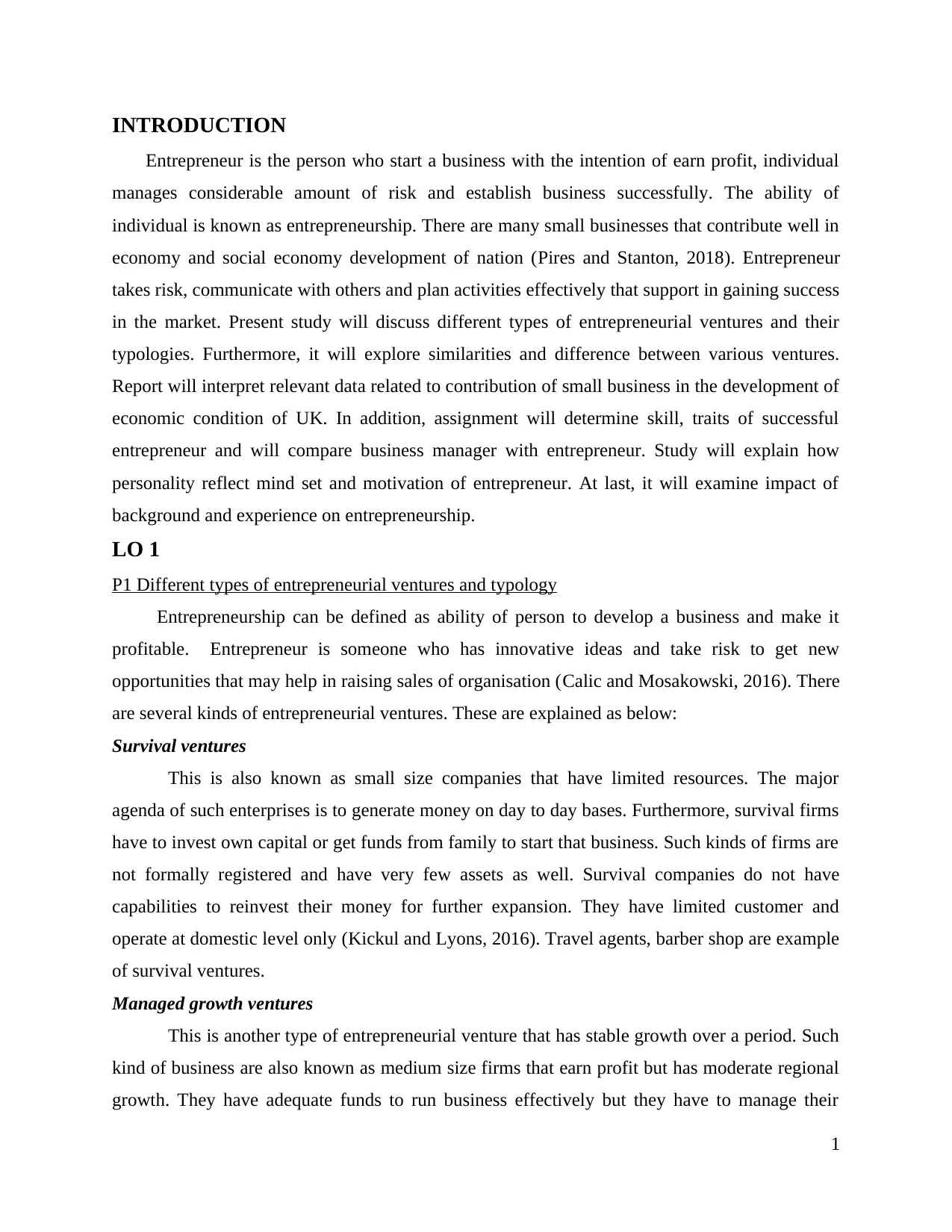
INTRODUCTION
Entrepreneur is the person who start a business with the intention of earn profit, individual
manages considerable amount of risk and establish business successfully. The ability of
individual is known as entrepreneurship. There are many small businesses that contribute well in
economy and social economy development of nation (Pires and Stanton, 2018). Entrepreneur
takes risk, communicate with others and plan activities effectively that support in gaining success
in the market. Present study will discuss different types of entrepreneurial ventures and their
typologies. Furthermore, it will explore similarities and difference between various ventures.
Report will interpret relevant data related to contribution of small business in the development of
economic condition of UK. In addition, assignment will determine skill, traits of successful
entrepreneur and will compare business manager with entrepreneur. Study will explain how
personality reflect mind set and motivation of entrepreneur. At last, it will examine impact of
background and experience on entrepreneurship.
LO 1
P1 Different types of entrepreneurial ventures and typology
Entrepreneurship can be defined as ability of person to develop a business and make it
profitable. Entrepreneur is someone who has innovative ideas and take risk to get new
opportunities that may help in raising sales of organisation (Calic and Mosakowski, 2016). There
are several kinds of entrepreneurial ventures. These are explained as below:
Survival ventures
This is also known as small size companies that have limited resources. The major
agenda of such enterprises is to generate money on day to day bases. Furthermore, survival firms
have to invest own capital or get funds from family to start that business. Such kinds of firms are
not formally registered and have very few assets as well. Survival companies do not have
capabilities to reinvest their money for further expansion. They have limited customer and
operate at domestic level only (Kickul and Lyons, 2016). Travel agents, barber shop are example
of survival ventures.
Managed growth ventures
This is another type of entrepreneurial venture that has stable growth over a period. Such
kind of business are also known as medium size firms that earn profit but has moderate regional
growth. They have adequate funds to run business effectively but they have to manage their
1
Entrepreneur is the person who start a business with the intention of earn profit, individual
manages considerable amount of risk and establish business successfully. The ability of
individual is known as entrepreneurship. There are many small businesses that contribute well in
economy and social economy development of nation (Pires and Stanton, 2018). Entrepreneur
takes risk, communicate with others and plan activities effectively that support in gaining success
in the market. Present study will discuss different types of entrepreneurial ventures and their
typologies. Furthermore, it will explore similarities and difference between various ventures.
Report will interpret relevant data related to contribution of small business in the development of
economic condition of UK. In addition, assignment will determine skill, traits of successful
entrepreneur and will compare business manager with entrepreneur. Study will explain how
personality reflect mind set and motivation of entrepreneur. At last, it will examine impact of
background and experience on entrepreneurship.
LO 1
P1 Different types of entrepreneurial ventures and typology
Entrepreneurship can be defined as ability of person to develop a business and make it
profitable. Entrepreneur is someone who has innovative ideas and take risk to get new
opportunities that may help in raising sales of organisation (Calic and Mosakowski, 2016). There
are several kinds of entrepreneurial ventures. These are explained as below:
Survival ventures
This is also known as small size companies that have limited resources. The major
agenda of such enterprises is to generate money on day to day bases. Furthermore, survival firms
have to invest own capital or get funds from family to start that business. Such kinds of firms are
not formally registered and have very few assets as well. Survival companies do not have
capabilities to reinvest their money for further expansion. They have limited customer and
operate at domestic level only (Kickul and Lyons, 2016). Travel agents, barber shop are example
of survival ventures.
Managed growth ventures
This is another type of entrepreneurial venture that has stable growth over a period. Such
kind of business are also known as medium size firms that earn profit but has moderate regional
growth. They have adequate funds to run business effectively but they have to manage their
1
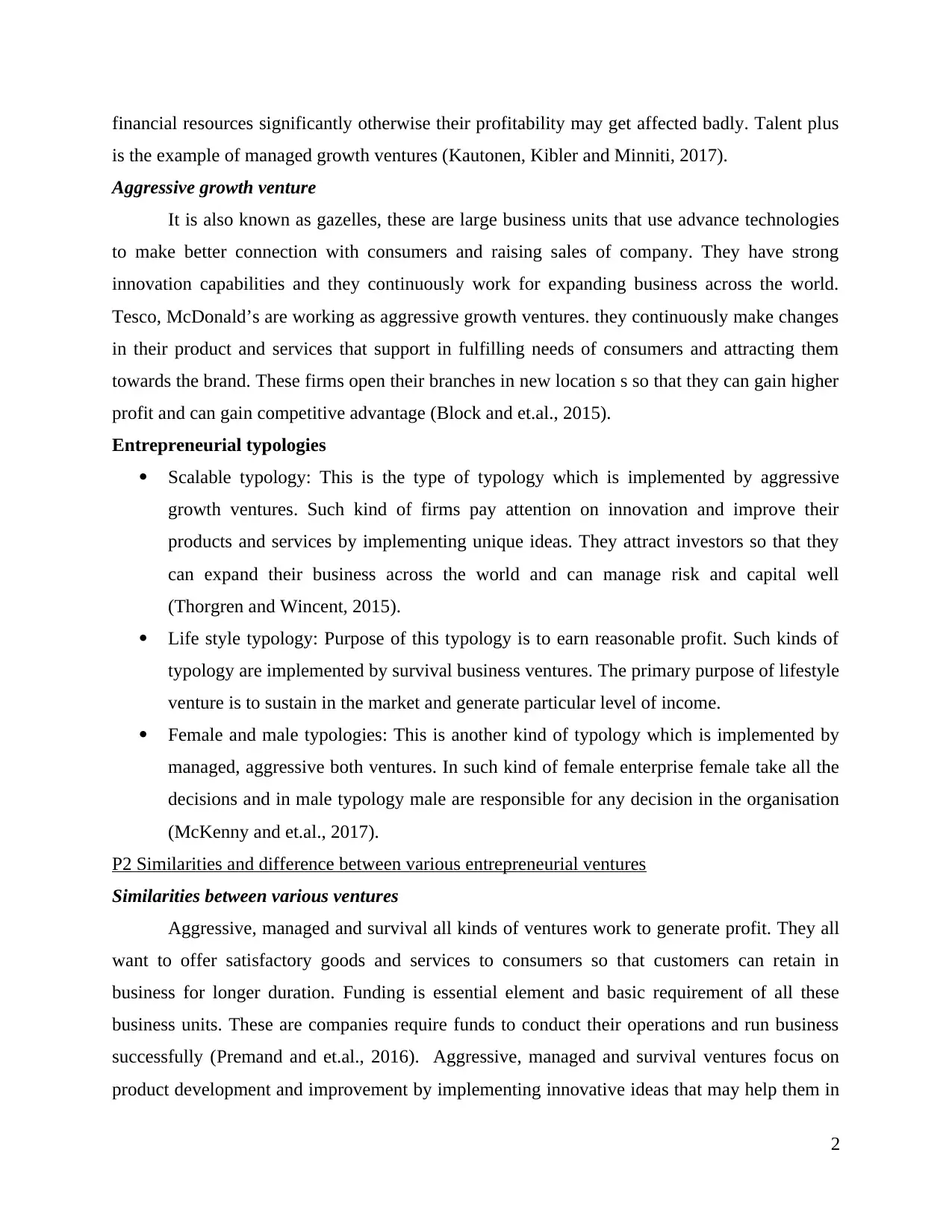
financial resources significantly otherwise their profitability may get affected badly. Talent plus
is the example of managed growth ventures (Kautonen, Kibler and Minniti, 2017).
Aggressive growth venture
It is also known as gazelles, these are large business units that use advance technologies
to make better connection with consumers and raising sales of company. They have strong
innovation capabilities and they continuously work for expanding business across the world.
Tesco, McDonald’s are working as aggressive growth ventures. they continuously make changes
in their product and services that support in fulfilling needs of consumers and attracting them
towards the brand. These firms open their branches in new location s so that they can gain higher
profit and can gain competitive advantage (Block and et.al., 2015).
Entrepreneurial typologies
Scalable typology: This is the type of typology which is implemented by aggressive
growth ventures. Such kind of firms pay attention on innovation and improve their
products and services by implementing unique ideas. They attract investors so that they
can expand their business across the world and can manage risk and capital well
(Thorgren and Wincent, 2015).
Life style typology: Purpose of this typology is to earn reasonable profit. Such kinds of
typology are implemented by survival business ventures. The primary purpose of lifestyle
venture is to sustain in the market and generate particular level of income.
Female and male typologies: This is another kind of typology which is implemented by
managed, aggressive both ventures. In such kind of female enterprise female take all the
decisions and in male typology male are responsible for any decision in the organisation
(McKenny and et.al., 2017).
P2 Similarities and difference between various entrepreneurial ventures
Similarities between various ventures
Aggressive, managed and survival all kinds of ventures work to generate profit. They all
want to offer satisfactory goods and services to consumers so that customers can retain in
business for longer duration. Funding is essential element and basic requirement of all these
business units. These are companies require funds to conduct their operations and run business
successfully (Premand and et.al., 2016). Aggressive, managed and survival ventures focus on
product development and improvement by implementing innovative ideas that may help them in
2
is the example of managed growth ventures (Kautonen, Kibler and Minniti, 2017).
Aggressive growth venture
It is also known as gazelles, these are large business units that use advance technologies
to make better connection with consumers and raising sales of company. They have strong
innovation capabilities and they continuously work for expanding business across the world.
Tesco, McDonald’s are working as aggressive growth ventures. they continuously make changes
in their product and services that support in fulfilling needs of consumers and attracting them
towards the brand. These firms open their branches in new location s so that they can gain higher
profit and can gain competitive advantage (Block and et.al., 2015).
Entrepreneurial typologies
Scalable typology: This is the type of typology which is implemented by aggressive
growth ventures. Such kind of firms pay attention on innovation and improve their
products and services by implementing unique ideas. They attract investors so that they
can expand their business across the world and can manage risk and capital well
(Thorgren and Wincent, 2015).
Life style typology: Purpose of this typology is to earn reasonable profit. Such kinds of
typology are implemented by survival business ventures. The primary purpose of lifestyle
venture is to sustain in the market and generate particular level of income.
Female and male typologies: This is another kind of typology which is implemented by
managed, aggressive both ventures. In such kind of female enterprise female take all the
decisions and in male typology male are responsible for any decision in the organisation
(McKenny and et.al., 2017).
P2 Similarities and difference between various entrepreneurial ventures
Similarities between various ventures
Aggressive, managed and survival all kinds of ventures work to generate profit. They all
want to offer satisfactory goods and services to consumers so that customers can retain in
business for longer duration. Funding is essential element and basic requirement of all these
business units. These are companies require funds to conduct their operations and run business
successfully (Premand and et.al., 2016). Aggressive, managed and survival ventures focus on
product development and improvement by implementing innovative ideas that may help them in
2
Secure Best Marks with AI Grader
Need help grading? Try our AI Grader for instant feedback on your assignments.
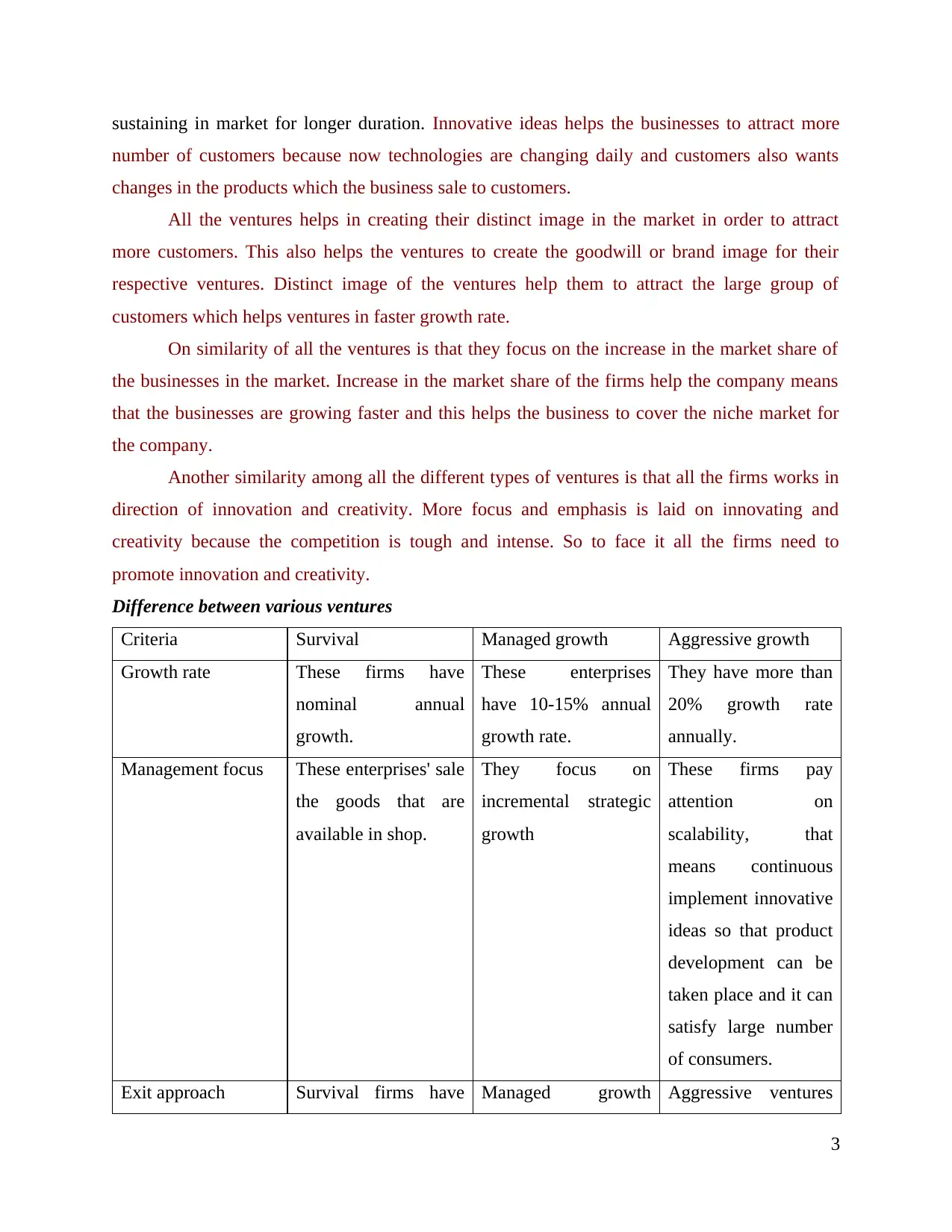
sustaining in market for longer duration. Innovative ideas helps the businesses to attract more
number of customers because now technologies are changing daily and customers also wants
changes in the products which the business sale to customers.
All the ventures helps in creating their distinct image in the market in order to attract
more customers. This also helps the ventures to create the goodwill or brand image for their
respective ventures. Distinct image of the ventures help them to attract the large group of
customers which helps ventures in faster growth rate.
On similarity of all the ventures is that they focus on the increase in the market share of
the businesses in the market. Increase in the market share of the firms help the company means
that the businesses are growing faster and this helps the business to cover the niche market for
the company.
Another similarity among all the different types of ventures is that all the firms works in
direction of innovation and creativity. More focus and emphasis is laid on innovating and
creativity because the competition is tough and intense. So to face it all the firms need to
promote innovation and creativity.
Difference between various ventures
Criteria Survival Managed growth Aggressive growth
Growth rate These firms have
nominal annual
growth.
These enterprises
have 10-15% annual
growth rate.
They have more than
20% growth rate
annually.
Management focus These enterprises' sale
the goods that are
available in shop.
They focus on
incremental strategic
growth
These firms pay
attention on
scalability, that
means continuous
implement innovative
ideas so that product
development can be
taken place and it can
satisfy large number
of consumers.
Exit approach Survival firms have Managed growth Aggressive ventures
3
number of customers because now technologies are changing daily and customers also wants
changes in the products which the business sale to customers.
All the ventures helps in creating their distinct image in the market in order to attract
more customers. This also helps the ventures to create the goodwill or brand image for their
respective ventures. Distinct image of the ventures help them to attract the large group of
customers which helps ventures in faster growth rate.
On similarity of all the ventures is that they focus on the increase in the market share of
the businesses in the market. Increase in the market share of the firms help the company means
that the businesses are growing faster and this helps the business to cover the niche market for
the company.
Another similarity among all the different types of ventures is that all the firms works in
direction of innovation and creativity. More focus and emphasis is laid on innovating and
creativity because the competition is tough and intense. So to face it all the firms need to
promote innovation and creativity.
Difference between various ventures
Criteria Survival Managed growth Aggressive growth
Growth rate These firms have
nominal annual
growth.
These enterprises
have 10-15% annual
growth rate.
They have more than
20% growth rate
annually.
Management focus These enterprises' sale
the goods that are
available in shop.
They focus on
incremental strategic
growth
These firms pay
attention on
scalability, that
means continuous
implement innovative
ideas so that product
development can be
taken place and it can
satisfy large number
of consumers.
Exit approach Survival firms have Managed growth Aggressive ventures
3
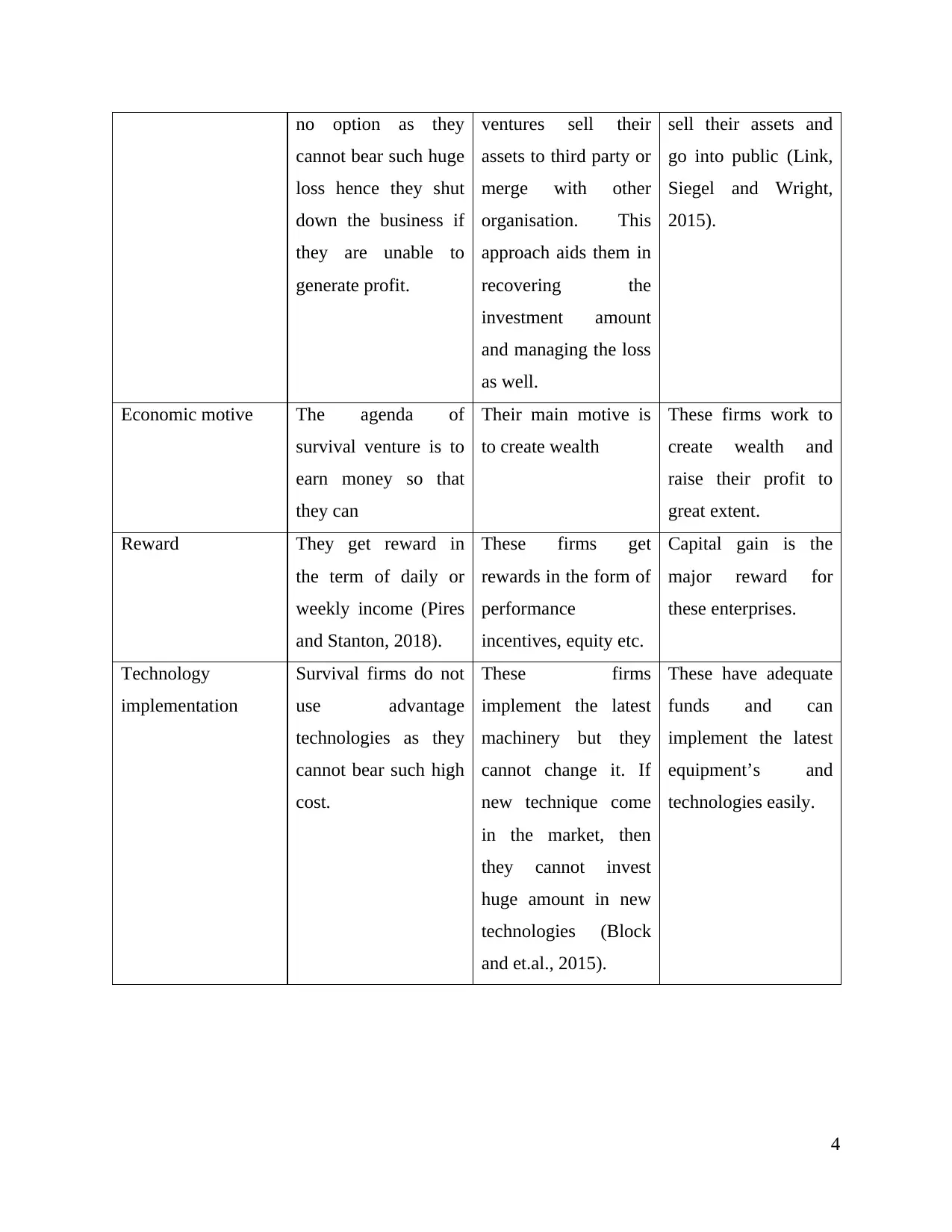
no option as they
cannot bear such huge
loss hence they shut
down the business if
they are unable to
generate profit.
ventures sell their
assets to third party or
merge with other
organisation. This
approach aids them in
recovering the
investment amount
and managing the loss
as well.
sell their assets and
go into public (Link,
Siegel and Wright,
2015).
Economic motive The agenda of
survival venture is to
earn money so that
they can
Their main motive is
to create wealth
These firms work to
create wealth and
raise their profit to
great extent.
Reward They get reward in
the term of daily or
weekly income (Pires
and Stanton, 2018).
These firms get
rewards in the form of
performance
incentives, equity etc.
Capital gain is the
major reward for
these enterprises.
Technology
implementation
Survival firms do not
use advantage
technologies as they
cannot bear such high
cost.
These firms
implement the latest
machinery but they
cannot change it. If
new technique come
in the market, then
they cannot invest
huge amount in new
technologies (Block
and et.al., 2015).
These have adequate
funds and can
implement the latest
equipment’s and
technologies easily.
4
cannot bear such huge
loss hence they shut
down the business if
they are unable to
generate profit.
ventures sell their
assets to third party or
merge with other
organisation. This
approach aids them in
recovering the
investment amount
and managing the loss
as well.
sell their assets and
go into public (Link,
Siegel and Wright,
2015).
Economic motive The agenda of
survival venture is to
earn money so that
they can
Their main motive is
to create wealth
These firms work to
create wealth and
raise their profit to
great extent.
Reward They get reward in
the term of daily or
weekly income (Pires
and Stanton, 2018).
These firms get
rewards in the form of
performance
incentives, equity etc.
Capital gain is the
major reward for
these enterprises.
Technology
implementation
Survival firms do not
use advantage
technologies as they
cannot bear such high
cost.
These firms
implement the latest
machinery but they
cannot change it. If
new technique come
in the market, then
they cannot invest
huge amount in new
technologies (Block
and et.al., 2015).
These have adequate
funds and can
implement the latest
equipment’s and
technologies easily.
4
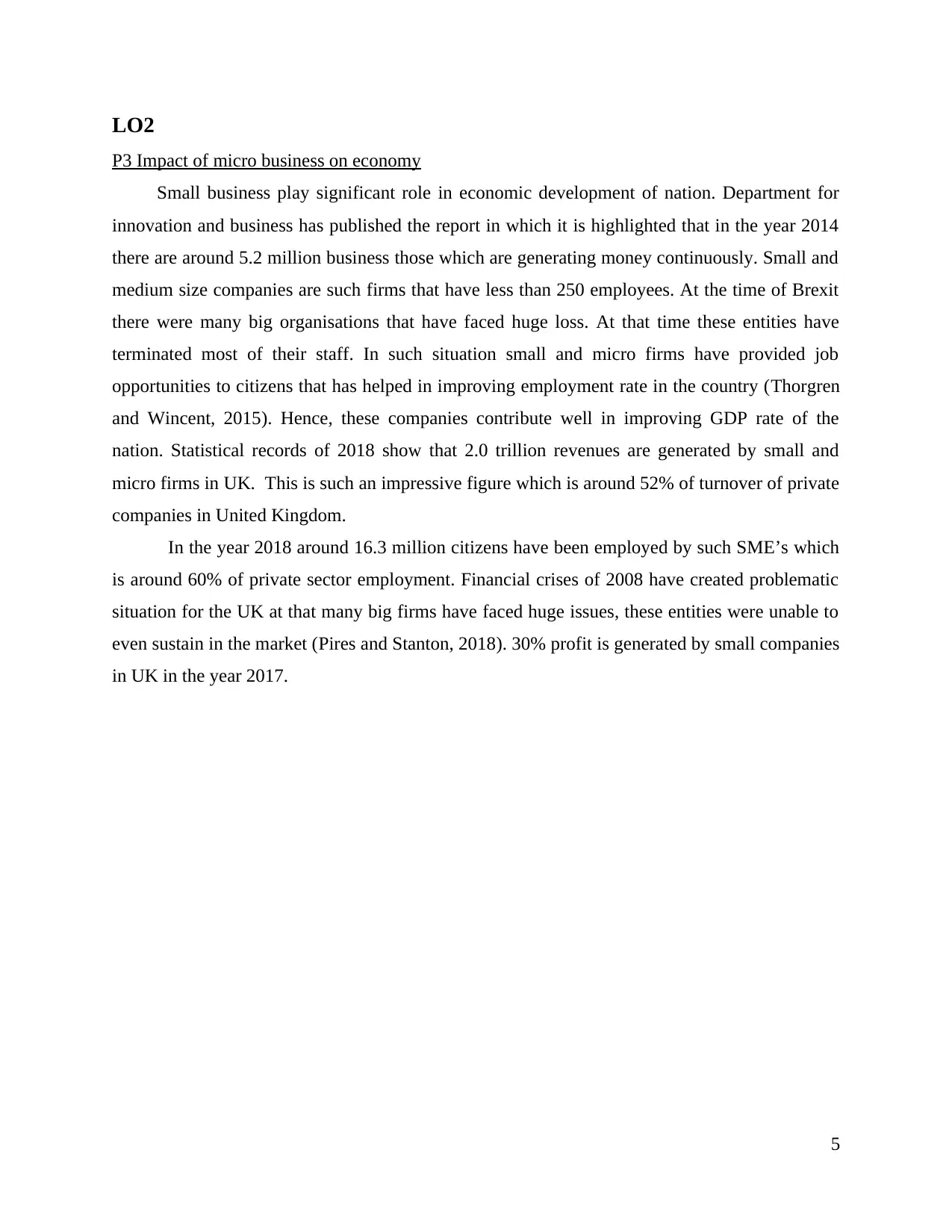
LO2
P3 Impact of micro business on economy
Small business play significant role in economic development of nation. Department for
innovation and business has published the report in which it is highlighted that in the year 2014
there are around 5.2 million business those which are generating money continuously. Small and
medium size companies are such firms that have less than 250 employees. At the time of Brexit
there were many big organisations that have faced huge loss. At that time these entities have
terminated most of their staff. In such situation small and micro firms have provided job
opportunities to citizens that has helped in improving employment rate in the country (Thorgren
and Wincent, 2015). Hence, these companies contribute well in improving GDP rate of the
nation. Statistical records of 2018 show that 2.0 trillion revenues are generated by small and
micro firms in UK. This is such an impressive figure which is around 52% of turnover of private
companies in United Kingdom.
In the year 2018 around 16.3 million citizens have been employed by such SME’s which
is around 60% of private sector employment. Financial crises of 2008 have created problematic
situation for the UK at that many big firms have faced huge issues, these entities were unable to
even sustain in the market (Pires and Stanton, 2018). 30% profit is generated by small companies
in UK in the year 2017.
5
P3 Impact of micro business on economy
Small business play significant role in economic development of nation. Department for
innovation and business has published the report in which it is highlighted that in the year 2014
there are around 5.2 million business those which are generating money continuously. Small and
medium size companies are such firms that have less than 250 employees. At the time of Brexit
there were many big organisations that have faced huge loss. At that time these entities have
terminated most of their staff. In such situation small and micro firms have provided job
opportunities to citizens that has helped in improving employment rate in the country (Thorgren
and Wincent, 2015). Hence, these companies contribute well in improving GDP rate of the
nation. Statistical records of 2018 show that 2.0 trillion revenues are generated by small and
micro firms in UK. This is such an impressive figure which is around 52% of turnover of private
companies in United Kingdom.
In the year 2018 around 16.3 million citizens have been employed by such SME’s which
is around 60% of private sector employment. Financial crises of 2008 have created problematic
situation for the UK at that many big firms have faced huge issues, these entities were unable to
even sustain in the market (Pires and Stanton, 2018). 30% profit is generated by small companies
in UK in the year 2017.
5
Paraphrase This Document
Need a fresh take? Get an instant paraphrase of this document with our AI Paraphraser
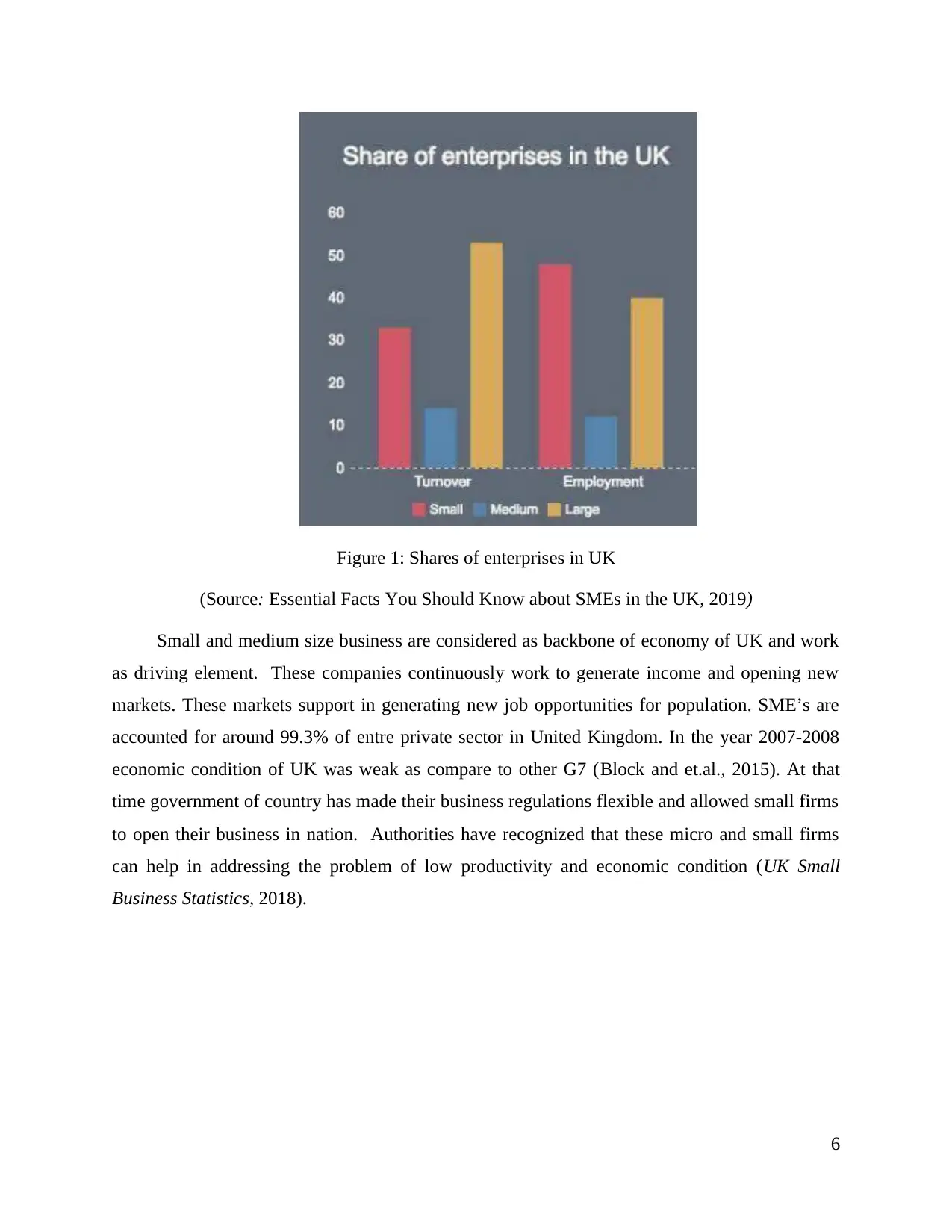
Figure 1: Shares of enterprises in UK
(Source: Essential Facts You Should Know about SMEs in the UK, 2019)
Small and medium size business are considered as backbone of economy of UK and work
as driving element. These companies continuously work to generate income and opening new
markets. These markets support in generating new job opportunities for population. SME’s are
accounted for around 99.3% of entre private sector in United Kingdom. In the year 2007-2008
economic condition of UK was weak as compare to other G7 (Block and et.al., 2015). At that
time government of country has made their business regulations flexible and allowed small firms
to open their business in nation. Authorities have recognized that these micro and small firms
can help in addressing the problem of low productivity and economic condition (UK Small
Business Statistics, 2018).
6
(Source: Essential Facts You Should Know about SMEs in the UK, 2019)
Small and medium size business are considered as backbone of economy of UK and work
as driving element. These companies continuously work to generate income and opening new
markets. These markets support in generating new job opportunities for population. SME’s are
accounted for around 99.3% of entre private sector in United Kingdom. In the year 2007-2008
economic condition of UK was weak as compare to other G7 (Block and et.al., 2015). At that
time government of country has made their business regulations flexible and allowed small firms
to open their business in nation. Authorities have recognized that these micro and small firms
can help in addressing the problem of low productivity and economic condition (UK Small
Business Statistics, 2018).
6
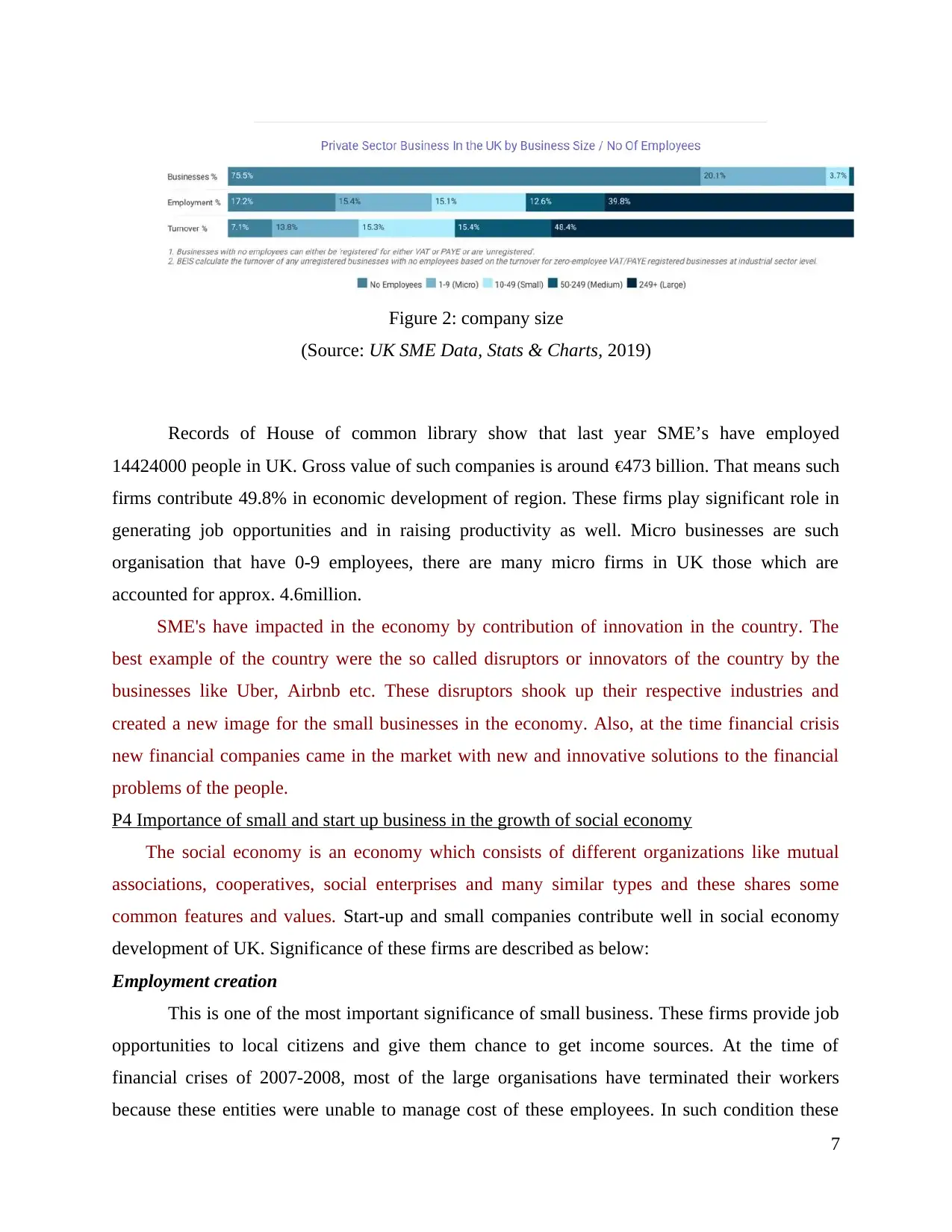
Figure 2: company size
(Source: UK SME Data, Stats & Charts, 2019)
Records of House of common library show that last year SME’s have employed
14424000 people in UK. Gross value of such companies is around €473 billion. That means such
firms contribute 49.8% in economic development of region. These firms play significant role in
generating job opportunities and in raising productivity as well. Micro businesses are such
organisation that have 0-9 employees, there are many micro firms in UK those which are
accounted for approx. 4.6million.
SME's have impacted in the economy by contribution of innovation in the country. The
best example of the country were the so called disruptors or innovators of the country by the
businesses like Uber, Airbnb etc. These disruptors shook up their respective industries and
created a new image for the small businesses in the economy. Also, at the time financial crisis
new financial companies came in the market with new and innovative solutions to the financial
problems of the people.
P4 Importance of small and start up business in the growth of social economy
The social economy is an economy which consists of different organizations like mutual
associations, cooperatives, social enterprises and many similar types and these shares some
common features and values. Start-up and small companies contribute well in social economy
development of UK. Significance of these firms are described as below:
Employment creation
This is one of the most important significance of small business. These firms provide job
opportunities to local citizens and give them chance to get income sources. At the time of
financial crises of 2007-2008, most of the large organisations have terminated their workers
because these entities were unable to manage cost of these employees. In such condition these
7
(Source: UK SME Data, Stats & Charts, 2019)
Records of House of common library show that last year SME’s have employed
14424000 people in UK. Gross value of such companies is around €473 billion. That means such
firms contribute 49.8% in economic development of region. These firms play significant role in
generating job opportunities and in raising productivity as well. Micro businesses are such
organisation that have 0-9 employees, there are many micro firms in UK those which are
accounted for approx. 4.6million.
SME's have impacted in the economy by contribution of innovation in the country. The
best example of the country were the so called disruptors or innovators of the country by the
businesses like Uber, Airbnb etc. These disruptors shook up their respective industries and
created a new image for the small businesses in the economy. Also, at the time financial crisis
new financial companies came in the market with new and innovative solutions to the financial
problems of the people.
P4 Importance of small and start up business in the growth of social economy
The social economy is an economy which consists of different organizations like mutual
associations, cooperatives, social enterprises and many similar types and these shares some
common features and values. Start-up and small companies contribute well in social economy
development of UK. Significance of these firms are described as below:
Employment creation
This is one of the most important significance of small business. These firms provide job
opportunities to local citizens and give them chance to get income sources. At the time of
financial crises of 2007-2008, most of the large organisations have terminated their workers
because these entities were unable to manage cost of these employees. In such condition these
7
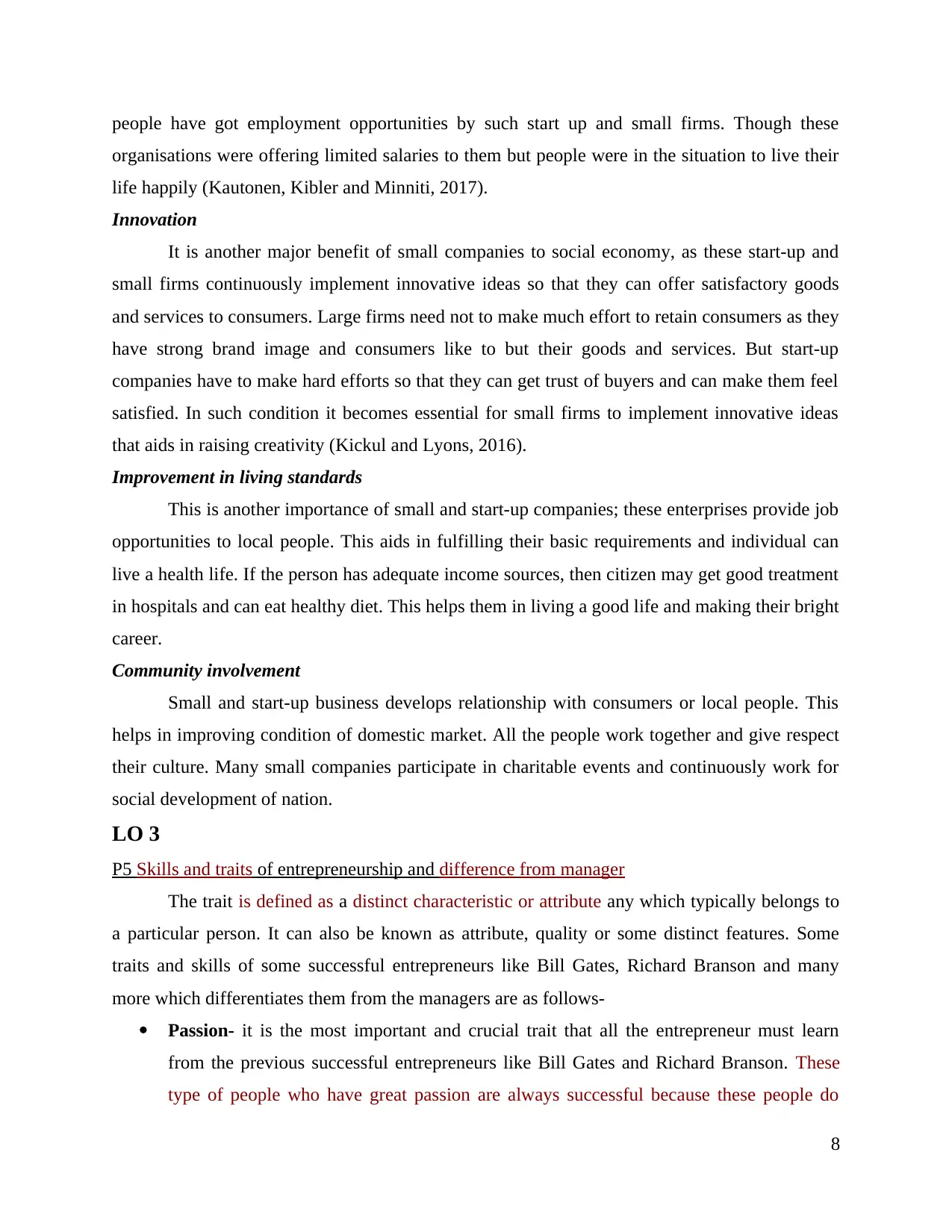
people have got employment opportunities by such start up and small firms. Though these
organisations were offering limited salaries to them but people were in the situation to live their
life happily (Kautonen, Kibler and Minniti, 2017).
Innovation
It is another major benefit of small companies to social economy, as these start-up and
small firms continuously implement innovative ideas so that they can offer satisfactory goods
and services to consumers. Large firms need not to make much effort to retain consumers as they
have strong brand image and consumers like to but their goods and services. But start-up
companies have to make hard efforts so that they can get trust of buyers and can make them feel
satisfied. In such condition it becomes essential for small firms to implement innovative ideas
that aids in raising creativity (Kickul and Lyons, 2016).
Improvement in living standards
This is another importance of small and start-up companies; these enterprises provide job
opportunities to local people. This aids in fulfilling their basic requirements and individual can
live a health life. If the person has adequate income sources, then citizen may get good treatment
in hospitals and can eat healthy diet. This helps them in living a good life and making their bright
career.
Community involvement
Small and start-up business develops relationship with consumers or local people. This
helps in improving condition of domestic market. All the people work together and give respect
their culture. Many small companies participate in charitable events and continuously work for
social development of nation.
LO 3
P5 Skills and traits of entrepreneurship and difference from manager
The trait is defined as a distinct characteristic or attribute any which typically belongs to
a particular person. It can also be known as attribute, quality or some distinct features. Some
traits and skills of some successful entrepreneurs like Bill Gates, Richard Branson and many
more which differentiates them from the managers are as follows-
Passion- it is the most important and crucial trait that all the entrepreneur must learn
from the previous successful entrepreneurs like Bill Gates and Richard Branson. These
type of people who have great passion are always successful because these people do
8
organisations were offering limited salaries to them but people were in the situation to live their
life happily (Kautonen, Kibler and Minniti, 2017).
Innovation
It is another major benefit of small companies to social economy, as these start-up and
small firms continuously implement innovative ideas so that they can offer satisfactory goods
and services to consumers. Large firms need not to make much effort to retain consumers as they
have strong brand image and consumers like to but their goods and services. But start-up
companies have to make hard efforts so that they can get trust of buyers and can make them feel
satisfied. In such condition it becomes essential for small firms to implement innovative ideas
that aids in raising creativity (Kickul and Lyons, 2016).
Improvement in living standards
This is another importance of small and start-up companies; these enterprises provide job
opportunities to local people. This aids in fulfilling their basic requirements and individual can
live a health life. If the person has adequate income sources, then citizen may get good treatment
in hospitals and can eat healthy diet. This helps them in living a good life and making their bright
career.
Community involvement
Small and start-up business develops relationship with consumers or local people. This
helps in improving condition of domestic market. All the people work together and give respect
their culture. Many small companies participate in charitable events and continuously work for
social development of nation.
LO 3
P5 Skills and traits of entrepreneurship and difference from manager
The trait is defined as a distinct characteristic or attribute any which typically belongs to
a particular person. It can also be known as attribute, quality or some distinct features. Some
traits and skills of some successful entrepreneurs like Bill Gates, Richard Branson and many
more which differentiates them from the managers are as follows-
Passion- it is the most important and crucial trait that all the entrepreneur must learn
from the previous successful entrepreneurs like Bill Gates and Richard Branson. These
type of people who have great passion are always successful because these people do
8
Secure Best Marks with AI Grader
Need help grading? Try our AI Grader for instant feedback on your assignments.
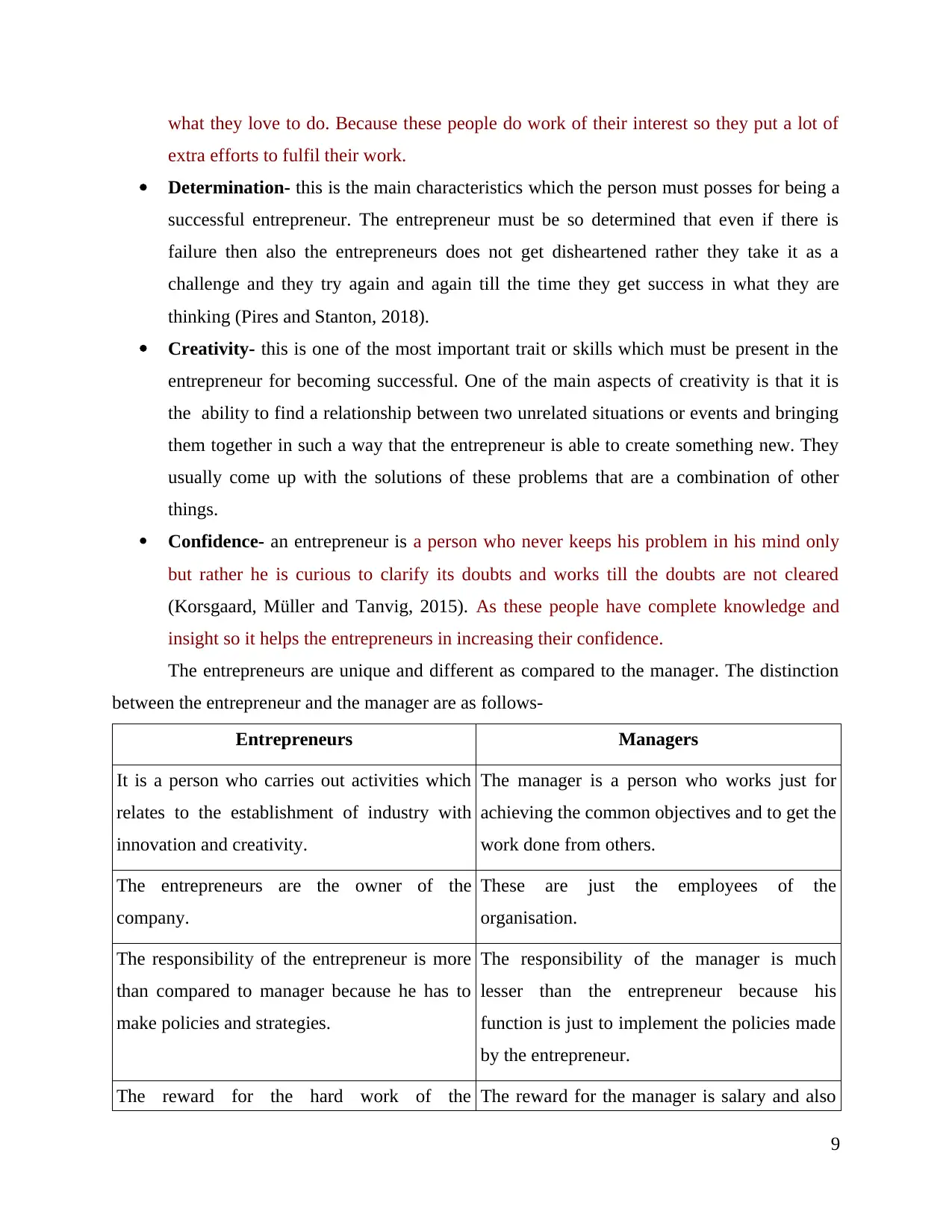
what they love to do. Because these people do work of their interest so they put a lot of
extra efforts to fulfil their work.
Determination- this is the main characteristics which the person must posses for being a
successful entrepreneur. The entrepreneur must be so determined that even if there is
failure then also the entrepreneurs does not get disheartened rather they take it as a
challenge and they try again and again till the time they get success in what they are
thinking (Pires and Stanton, 2018).
Creativity- this is one of the most important trait or skills which must be present in the
entrepreneur for becoming successful. One of the main aspects of creativity is that it is
the ability to find a relationship between two unrelated situations or events and bringing
them together in such a way that the entrepreneur is able to create something new. They
usually come up with the solutions of these problems that are a combination of other
things.
Confidence- an entrepreneur is a person who never keeps his problem in his mind only
but rather he is curious to clarify its doubts and works till the doubts are not cleared
(Korsgaard, Müller and Tanvig, 2015). As these people have complete knowledge and
insight so it helps the entrepreneurs in increasing their confidence.
The entrepreneurs are unique and different as compared to the manager. The distinction
between the entrepreneur and the manager are as follows-
Entrepreneurs Managers
It is a person who carries out activities which
relates to the establishment of industry with
innovation and creativity.
The manager is a person who works just for
achieving the common objectives and to get the
work done from others.
The entrepreneurs are the owner of the
company.
These are just the employees of the
organisation.
The responsibility of the entrepreneur is more
than compared to manager because he has to
make policies and strategies.
The responsibility of the manager is much
lesser than the entrepreneur because his
function is just to implement the policies made
by the entrepreneur.
The reward for the hard work of the The reward for the manager is salary and also
9
extra efforts to fulfil their work.
Determination- this is the main characteristics which the person must posses for being a
successful entrepreneur. The entrepreneur must be so determined that even if there is
failure then also the entrepreneurs does not get disheartened rather they take it as a
challenge and they try again and again till the time they get success in what they are
thinking (Pires and Stanton, 2018).
Creativity- this is one of the most important trait or skills which must be present in the
entrepreneur for becoming successful. One of the main aspects of creativity is that it is
the ability to find a relationship between two unrelated situations or events and bringing
them together in such a way that the entrepreneur is able to create something new. They
usually come up with the solutions of these problems that are a combination of other
things.
Confidence- an entrepreneur is a person who never keeps his problem in his mind only
but rather he is curious to clarify its doubts and works till the doubts are not cleared
(Korsgaard, Müller and Tanvig, 2015). As these people have complete knowledge and
insight so it helps the entrepreneurs in increasing their confidence.
The entrepreneurs are unique and different as compared to the manager. The distinction
between the entrepreneur and the manager are as follows-
Entrepreneurs Managers
It is a person who carries out activities which
relates to the establishment of industry with
innovation and creativity.
The manager is a person who works just for
achieving the common objectives and to get the
work done from others.
The entrepreneurs are the owner of the
company.
These are just the employees of the
organisation.
The responsibility of the entrepreneur is more
than compared to manager because he has to
make policies and strategies.
The responsibility of the manager is much
lesser than the entrepreneur because his
function is just to implement the policies made
by the entrepreneur.
The reward for the hard work of the The reward for the manager is salary and also
9
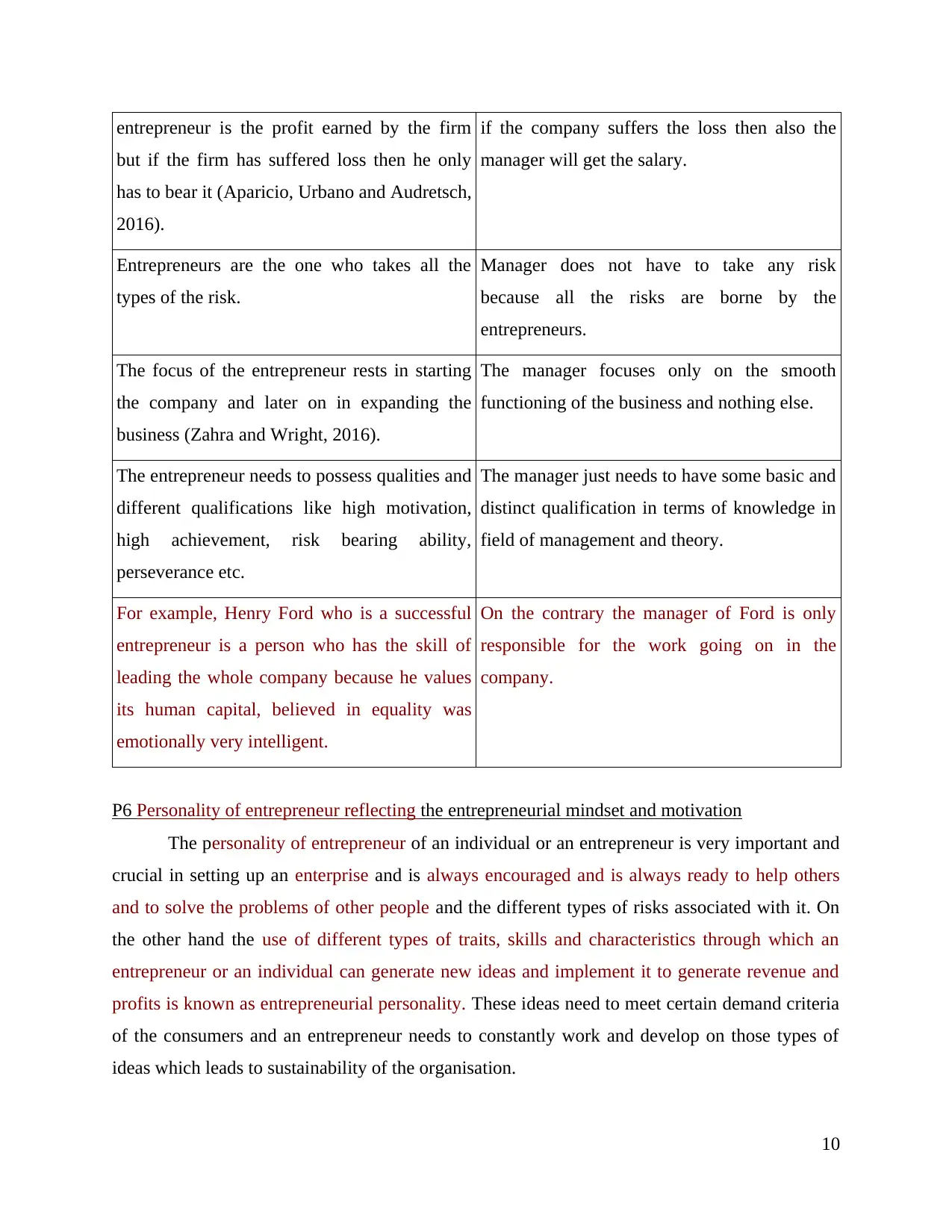
entrepreneur is the profit earned by the firm
but if the firm has suffered loss then he only
has to bear it (Aparicio, Urbano and Audretsch,
2016).
if the company suffers the loss then also the
manager will get the salary.
Entrepreneurs are the one who takes all the
types of the risk.
Manager does not have to take any risk
because all the risks are borne by the
entrepreneurs.
The focus of the entrepreneur rests in starting
the company and later on in expanding the
business (Zahra and Wright, 2016).
The manager focuses only on the smooth
functioning of the business and nothing else.
The entrepreneur needs to possess qualities and
different qualifications like high motivation,
high achievement, risk bearing ability,
perseverance etc.
The manager just needs to have some basic and
distinct qualification in terms of knowledge in
field of management and theory.
For example, Henry Ford who is a successful
entrepreneur is a person who has the skill of
leading the whole company because he values
its human capital, believed in equality was
emotionally very intelligent.
On the contrary the manager of Ford is only
responsible for the work going on in the
company.
P6 Personality of entrepreneur reflecting the entrepreneurial mindset and motivation
The personality of entrepreneur of an individual or an entrepreneur is very important and
crucial in setting up an enterprise and is always encouraged and is always ready to help others
and to solve the problems of other people and the different types of risks associated with it. On
the other hand the use of different types of traits, skills and characteristics through which an
entrepreneur or an individual can generate new ideas and implement it to generate revenue and
profits is known as entrepreneurial personality. These ideas need to meet certain demand criteria
of the consumers and an entrepreneur needs to constantly work and develop on those types of
ideas which leads to sustainability of the organisation.
10
but if the firm has suffered loss then he only
has to bear it (Aparicio, Urbano and Audretsch,
2016).
if the company suffers the loss then also the
manager will get the salary.
Entrepreneurs are the one who takes all the
types of the risk.
Manager does not have to take any risk
because all the risks are borne by the
entrepreneurs.
The focus of the entrepreneur rests in starting
the company and later on in expanding the
business (Zahra and Wright, 2016).
The manager focuses only on the smooth
functioning of the business and nothing else.
The entrepreneur needs to possess qualities and
different qualifications like high motivation,
high achievement, risk bearing ability,
perseverance etc.
The manager just needs to have some basic and
distinct qualification in terms of knowledge in
field of management and theory.
For example, Henry Ford who is a successful
entrepreneur is a person who has the skill of
leading the whole company because he values
its human capital, believed in equality was
emotionally very intelligent.
On the contrary the manager of Ford is only
responsible for the work going on in the
company.
P6 Personality of entrepreneur reflecting the entrepreneurial mindset and motivation
The personality of entrepreneur of an individual or an entrepreneur is very important and
crucial in setting up an enterprise and is always encouraged and is always ready to help others
and to solve the problems of other people and the different types of risks associated with it. On
the other hand the use of different types of traits, skills and characteristics through which an
entrepreneur or an individual can generate new ideas and implement it to generate revenue and
profits is known as entrepreneurial personality. These ideas need to meet certain demand criteria
of the consumers and an entrepreneur needs to constantly work and develop on those types of
ideas which leads to sustainability of the organisation.
10
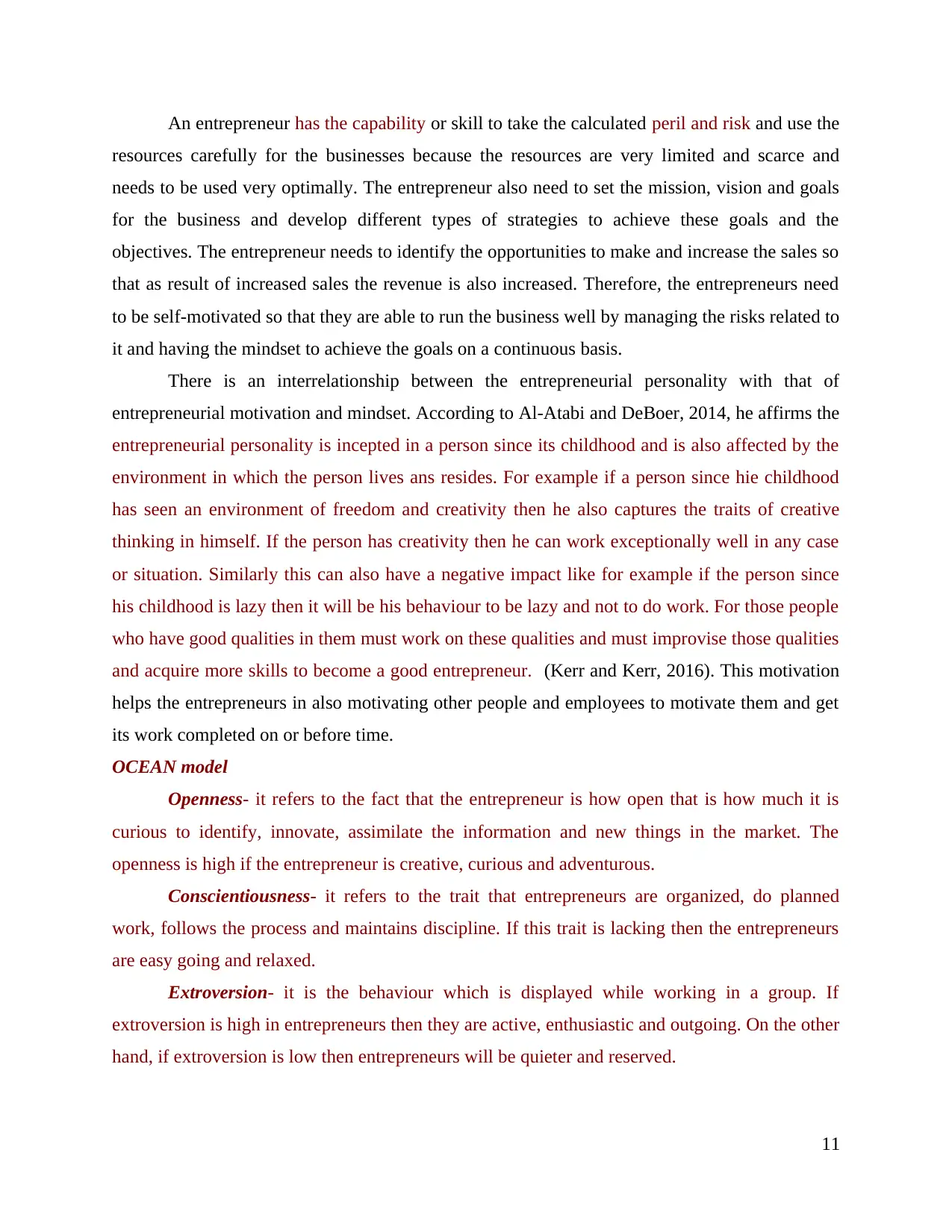
An entrepreneur has the capability or skill to take the calculated peril and risk and use the
resources carefully for the businesses because the resources are very limited and scarce and
needs to be used very optimally. The entrepreneur also need to set the mission, vision and goals
for the business and develop different types of strategies to achieve these goals and the
objectives. The entrepreneur needs to identify the opportunities to make and increase the sales so
that as result of increased sales the revenue is also increased. Therefore, the entrepreneurs need
to be self-motivated so that they are able to run the business well by managing the risks related to
it and having the mindset to achieve the goals on a continuous basis.
There is an interrelationship between the entrepreneurial personality with that of
entrepreneurial motivation and mindset. According to Al-Atabi and DeBoer, 2014, he affirms the
entrepreneurial personality is incepted in a person since its childhood and is also affected by the
environment in which the person lives ans resides. For example if a person since hie childhood
has seen an environment of freedom and creativity then he also captures the traits of creative
thinking in himself. If the person has creativity then he can work exceptionally well in any case
or situation. Similarly this can also have a negative impact like for example if the person since
his childhood is lazy then it will be his behaviour to be lazy and not to do work. For those people
who have good qualities in them must work on these qualities and must improvise those qualities
and acquire more skills to become a good entrepreneur. (Kerr and Kerr, 2016). This motivation
helps the entrepreneurs in also motivating other people and employees to motivate them and get
its work completed on or before time.
OCEAN model
Openness- it refers to the fact that the entrepreneur is how open that is how much it is
curious to identify, innovate, assimilate the information and new things in the market. The
openness is high if the entrepreneur is creative, curious and adventurous.
Conscientiousness- it refers to the trait that entrepreneurs are organized, do planned
work, follows the process and maintains discipline. If this trait is lacking then the entrepreneurs
are easy going and relaxed.
Extroversion- it is the behaviour which is displayed while working in a group. If
extroversion is high in entrepreneurs then they are active, enthusiastic and outgoing. On the other
hand, if extroversion is low then entrepreneurs will be quieter and reserved.
11
resources carefully for the businesses because the resources are very limited and scarce and
needs to be used very optimally. The entrepreneur also need to set the mission, vision and goals
for the business and develop different types of strategies to achieve these goals and the
objectives. The entrepreneur needs to identify the opportunities to make and increase the sales so
that as result of increased sales the revenue is also increased. Therefore, the entrepreneurs need
to be self-motivated so that they are able to run the business well by managing the risks related to
it and having the mindset to achieve the goals on a continuous basis.
There is an interrelationship between the entrepreneurial personality with that of
entrepreneurial motivation and mindset. According to Al-Atabi and DeBoer, 2014, he affirms the
entrepreneurial personality is incepted in a person since its childhood and is also affected by the
environment in which the person lives ans resides. For example if a person since hie childhood
has seen an environment of freedom and creativity then he also captures the traits of creative
thinking in himself. If the person has creativity then he can work exceptionally well in any case
or situation. Similarly this can also have a negative impact like for example if the person since
his childhood is lazy then it will be his behaviour to be lazy and not to do work. For those people
who have good qualities in them must work on these qualities and must improvise those qualities
and acquire more skills to become a good entrepreneur. (Kerr and Kerr, 2016). This motivation
helps the entrepreneurs in also motivating other people and employees to motivate them and get
its work completed on or before time.
OCEAN model
Openness- it refers to the fact that the entrepreneur is how open that is how much it is
curious to identify, innovate, assimilate the information and new things in the market. The
openness is high if the entrepreneur is creative, curious and adventurous.
Conscientiousness- it refers to the trait that entrepreneurs are organized, do planned
work, follows the process and maintains discipline. If this trait is lacking then the entrepreneurs
are easy going and relaxed.
Extroversion- it is the behaviour which is displayed while working in a group. If
extroversion is high in entrepreneurs then they are active, enthusiastic and outgoing. On the other
hand, if extroversion is low then entrepreneurs will be quieter and reserved.
11
Paraphrase This Document
Need a fresh take? Get an instant paraphrase of this document with our AI Paraphraser
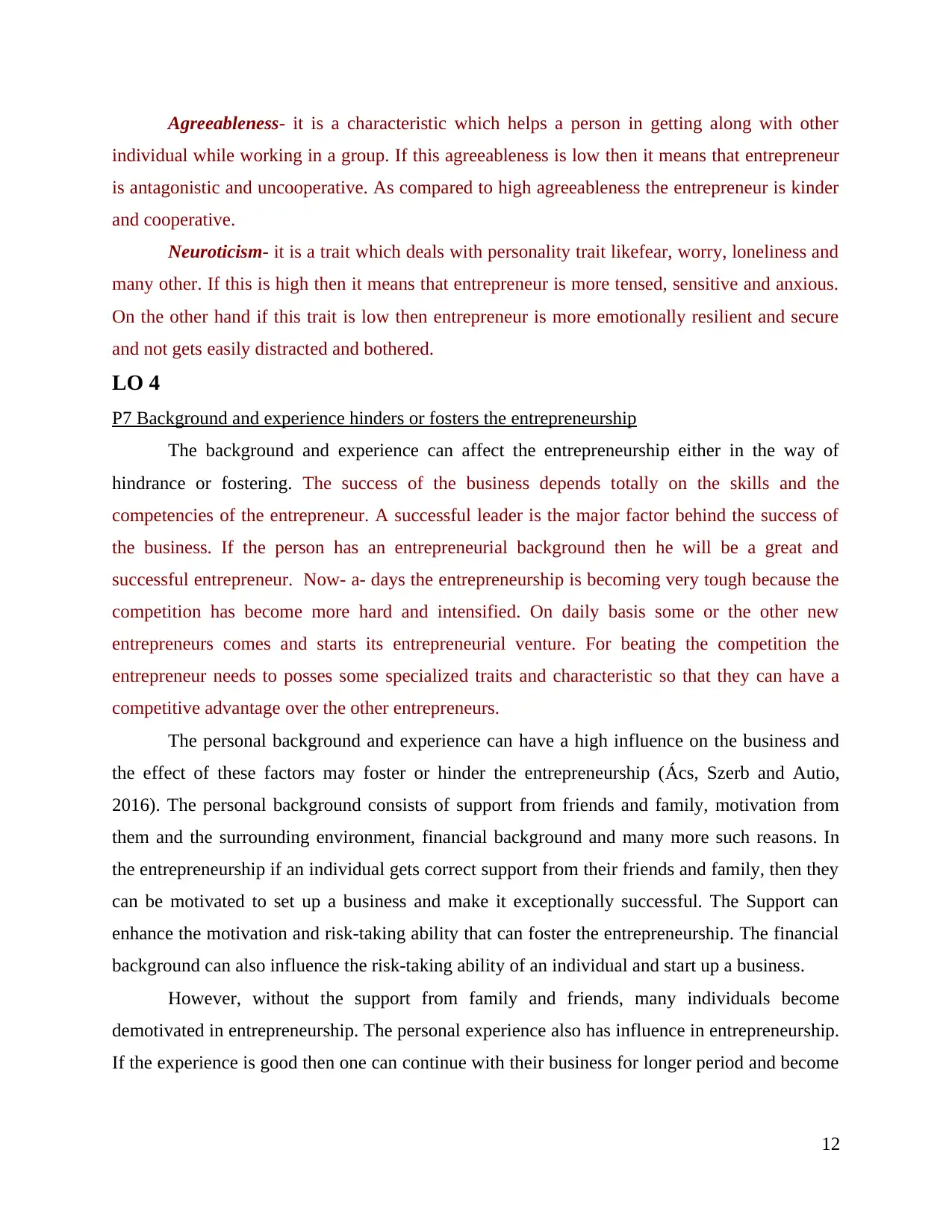
Agreeableness- it is a characteristic which helps a person in getting along with other
individual while working in a group. If this agreeableness is low then it means that entrepreneur
is antagonistic and uncooperative. As compared to high agreeableness the entrepreneur is kinder
and cooperative.
Neuroticism- it is a trait which deals with personality trait likefear, worry, loneliness and
many other. If this is high then it means that entrepreneur is more tensed, sensitive and anxious.
On the other hand if this trait is low then entrepreneur is more emotionally resilient and secure
and not gets easily distracted and bothered.
LO 4
P7 Background and experience hinders or fosters the entrepreneurship
The background and experience can affect the entrepreneurship either in the way of
hindrance or fostering. The success of the business depends totally on the skills and the
competencies of the entrepreneur. A successful leader is the major factor behind the success of
the business. If the person has an entrepreneurial background then he will be a great and
successful entrepreneur. Now- a- days the entrepreneurship is becoming very tough because the
competition has become more hard and intensified. On daily basis some or the other new
entrepreneurs comes and starts its entrepreneurial venture. For beating the competition the
entrepreneur needs to posses some specialized traits and characteristic so that they can have a
competitive advantage over the other entrepreneurs.
The personal background and experience can have a high influence on the business and
the effect of these factors may foster or hinder the entrepreneurship (Ács, Szerb and Autio,
2016). The personal background consists of support from friends and family, motivation from
them and the surrounding environment, financial background and many more such reasons. In
the entrepreneurship if an individual gets correct support from their friends and family, then they
can be motivated to set up a business and make it exceptionally successful. The Support can
enhance the motivation and risk-taking ability that can foster the entrepreneurship. The financial
background can also influence the risk-taking ability of an individual and start up a business.
However, without the support from family and friends, many individuals become
demotivated in entrepreneurship. The personal experience also has influence in entrepreneurship.
If the experience is good then one can continue with their business for longer period and become
12
individual while working in a group. If this agreeableness is low then it means that entrepreneur
is antagonistic and uncooperative. As compared to high agreeableness the entrepreneur is kinder
and cooperative.
Neuroticism- it is a trait which deals with personality trait likefear, worry, loneliness and
many other. If this is high then it means that entrepreneur is more tensed, sensitive and anxious.
On the other hand if this trait is low then entrepreneur is more emotionally resilient and secure
and not gets easily distracted and bothered.
LO 4
P7 Background and experience hinders or fosters the entrepreneurship
The background and experience can affect the entrepreneurship either in the way of
hindrance or fostering. The success of the business depends totally on the skills and the
competencies of the entrepreneur. A successful leader is the major factor behind the success of
the business. If the person has an entrepreneurial background then he will be a great and
successful entrepreneur. Now- a- days the entrepreneurship is becoming very tough because the
competition has become more hard and intensified. On daily basis some or the other new
entrepreneurs comes and starts its entrepreneurial venture. For beating the competition the
entrepreneur needs to posses some specialized traits and characteristic so that they can have a
competitive advantage over the other entrepreneurs.
The personal background and experience can have a high influence on the business and
the effect of these factors may foster or hinder the entrepreneurship (Ács, Szerb and Autio,
2016). The personal background consists of support from friends and family, motivation from
them and the surrounding environment, financial background and many more such reasons. In
the entrepreneurship if an individual gets correct support from their friends and family, then they
can be motivated to set up a business and make it exceptionally successful. The Support can
enhance the motivation and risk-taking ability that can foster the entrepreneurship. The financial
background can also influence the risk-taking ability of an individual and start up a business.
However, without the support from family and friends, many individuals become
demotivated in entrepreneurship. The personal experience also has influence in entrepreneurship.
If the experience is good then one can continue with their business for longer period and become
12
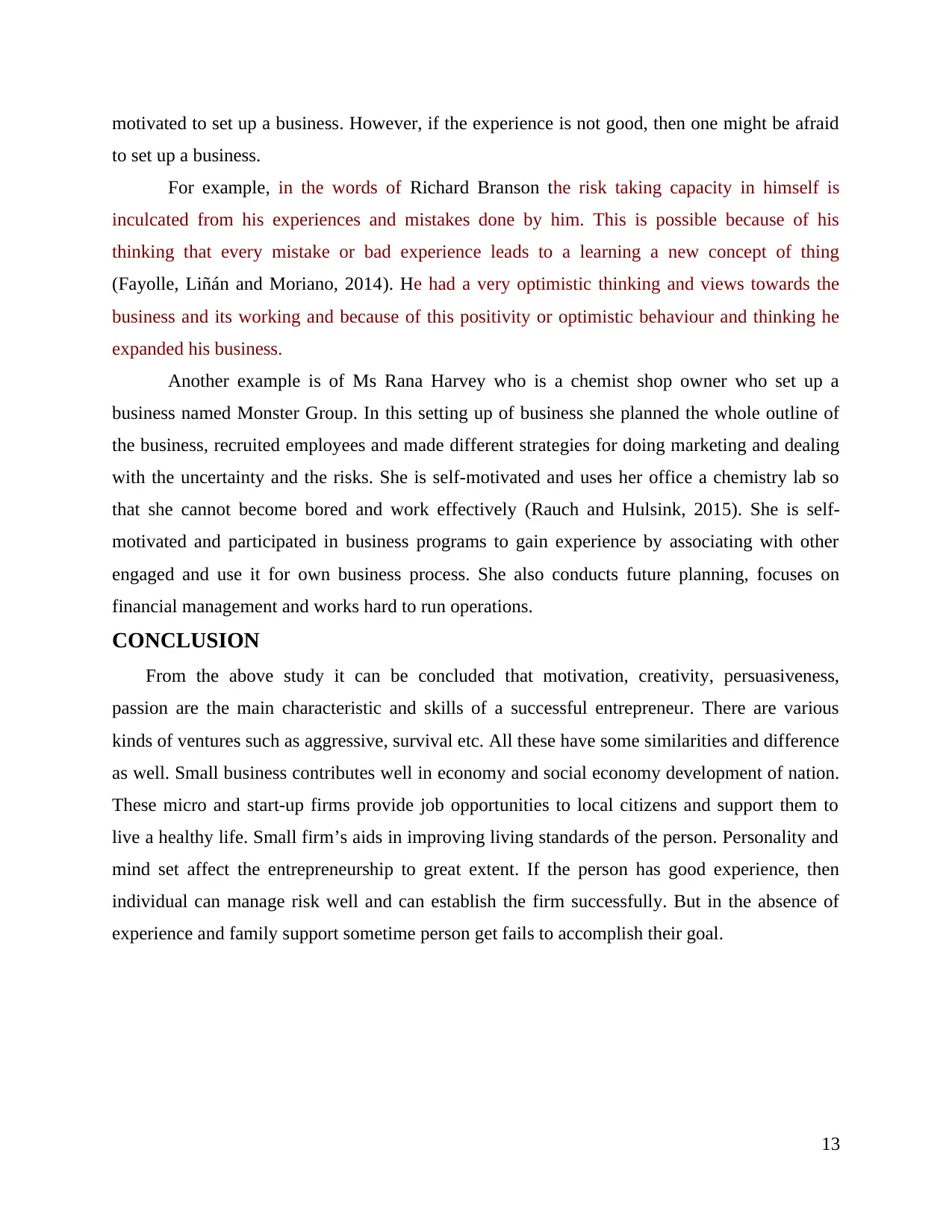
motivated to set up a business. However, if the experience is not good, then one might be afraid
to set up a business.
For example, in the words of Richard Branson the risk taking capacity in himself is
inculcated from his experiences and mistakes done by him. This is possible because of his
thinking that every mistake or bad experience leads to a learning a new concept of thing
(Fayolle, Liñán and Moriano, 2014). He had a very optimistic thinking and views towards the
business and its working and because of this positivity or optimistic behaviour and thinking he
expanded his business.
Another example is of Ms Rana Harvey who is a chemist shop owner who set up a
business named Monster Group. In this setting up of business she planned the whole outline of
the business, recruited employees and made different strategies for doing marketing and dealing
with the uncertainty and the risks. She is self-motivated and uses her office a chemistry lab so
that she cannot become bored and work effectively (Rauch and Hulsink, 2015). She is self-
motivated and participated in business programs to gain experience by associating with other
engaged and use it for own business process. She also conducts future planning, focuses on
financial management and works hard to run operations.
CONCLUSION
From the above study it can be concluded that motivation, creativity, persuasiveness,
passion are the main characteristic and skills of a successful entrepreneur. There are various
kinds of ventures such as aggressive, survival etc. All these have some similarities and difference
as well. Small business contributes well in economy and social economy development of nation.
These micro and start-up firms provide job opportunities to local citizens and support them to
live a healthy life. Small firm’s aids in improving living standards of the person. Personality and
mind set affect the entrepreneurship to great extent. If the person has good experience, then
individual can manage risk well and can establish the firm successfully. But in the absence of
experience and family support sometime person get fails to accomplish their goal.
13
to set up a business.
For example, in the words of Richard Branson the risk taking capacity in himself is
inculcated from his experiences and mistakes done by him. This is possible because of his
thinking that every mistake or bad experience leads to a learning a new concept of thing
(Fayolle, Liñán and Moriano, 2014). He had a very optimistic thinking and views towards the
business and its working and because of this positivity or optimistic behaviour and thinking he
expanded his business.
Another example is of Ms Rana Harvey who is a chemist shop owner who set up a
business named Monster Group. In this setting up of business she planned the whole outline of
the business, recruited employees and made different strategies for doing marketing and dealing
with the uncertainty and the risks. She is self-motivated and uses her office a chemistry lab so
that she cannot become bored and work effectively (Rauch and Hulsink, 2015). She is self-
motivated and participated in business programs to gain experience by associating with other
engaged and use it for own business process. She also conducts future planning, focuses on
financial management and works hard to run operations.
CONCLUSION
From the above study it can be concluded that motivation, creativity, persuasiveness,
passion are the main characteristic and skills of a successful entrepreneur. There are various
kinds of ventures such as aggressive, survival etc. All these have some similarities and difference
as well. Small business contributes well in economy and social economy development of nation.
These micro and start-up firms provide job opportunities to local citizens and support them to
live a healthy life. Small firm’s aids in improving living standards of the person. Personality and
mind set affect the entrepreneurship to great extent. If the person has good experience, then
individual can manage risk well and can establish the firm successfully. But in the absence of
experience and family support sometime person get fails to accomplish their goal.
13
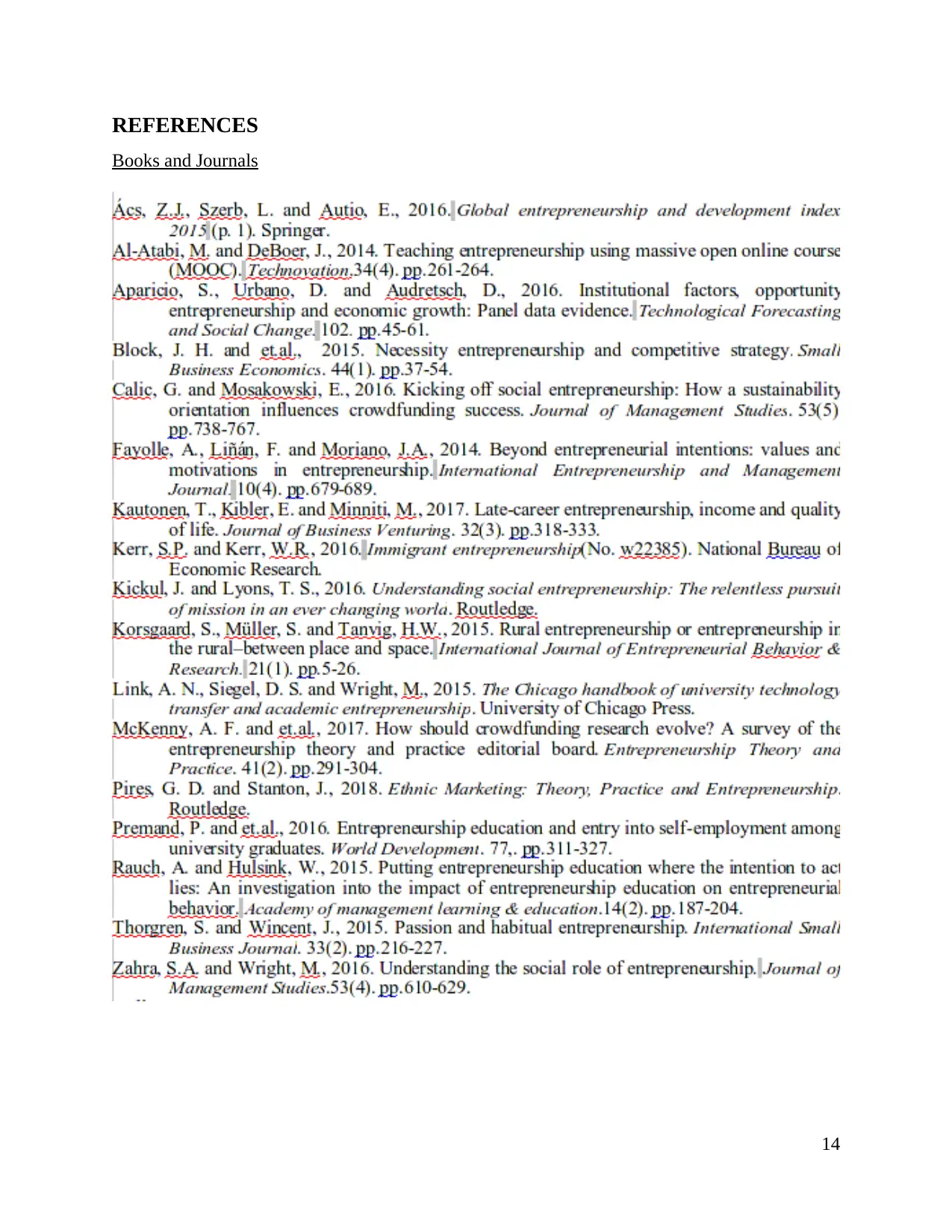
REFERENCES
Books and Journals
14
Books and Journals
14
Secure Best Marks with AI Grader
Need help grading? Try our AI Grader for instant feedback on your assignments.

15
1 out of 17
Related Documents
Your All-in-One AI-Powered Toolkit for Academic Success.
+13062052269
info@desklib.com
Available 24*7 on WhatsApp / Email
![[object Object]](/_next/static/media/star-bottom.7253800d.svg)
Unlock your academic potential
© 2024 | Zucol Services PVT LTD | All rights reserved.





